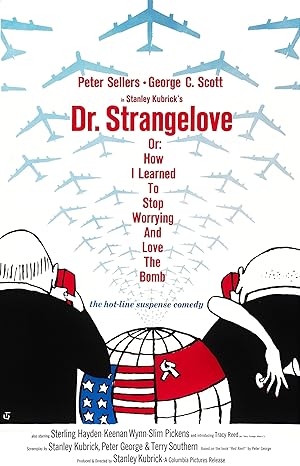Dr. Strangelove or: How I Learned to Stop Worrying and Love the Bomb
| 1964Directed by: Stanley Kubrick
Main Plot
Dr. Strangelove or: How I Learned to Stop Worrying and Love the Bomb is a satirical exploration of Cold War tensions and the absurdity of nuclear warfare. The story begins when a deranged U.S. general orders a nuclear strike against the Soviet Union without presidential approval. As the military and government scramble to respond, a group of officials, including the President, convenes in a war room to assess the situation and prevent global catastrophe. Meanwhile, a British officer attempts to intercept the rogue bombers. The film highlights the incompetence and irrationality of those in power, showcasing the dark humor inherent in the potential for mutual destruction. Through a series of chaotic and comedic events, the narrative critiques the arms race and the precarious balance of power during the Cold War, ultimately questioning the sanity of a world on the brink of annihilation.
Characters
- Peter Sellers plays Group Captain Lionel Mandrake, President Merkin Muffley, and Dr. Strangelove, each pivotal in navigating the nuclear crisis and attempting to prevent global catastrophe.
- George C. Scott plays General Buck Turgidson, a hawkish military leader advocating aggressive action during a nuclear crisis, adding tension and dark humor to the plot.
- Sterling Hayden plays Brigadier General Jack D. Ripper, who initiates a nuclear strike on the Soviet Union, believing in a communist conspiracy to fluoridate American water supplies.
Ending Explained
In the ending of Dr. Strangelove or: How I Learned to Stop Worrying and Love the Bomb, the film culminates in a chaotic and darkly comedic resolution to the nuclear crisis. After a series of miscommunications and escalating tensions, a rogue general has initiated a nuclear strike against the Soviet Union, believing it to be the only way to assert American dominance. As the U.S. government scrambles to prevent total annihilation, the doomsday clock ticks closer to midnight. The climax occurs in the War Room, where the President and his advisors attempt to recall the bombers. However, their efforts are futile, and the inevitable destruction looms. In a final twist, Dr. Strangelove, a former Nazi scientist, suggests that the only solution is to build underground shelters to survive the impending apocalypse. This absurd proposal highlights the film's satirical take on Cold War paranoia and the absurdity of nuclear deterrence. As the bombs drop, the film ends with a montage of nuclear explosions set to the song "We'll Meet Again," underscoring the irony of humanity's self-destruction. The ending encapsulates the overarching themes of absurdity, fear, and the futility of war, leaving viewers to reflect on the precariousness of existence in the nuclear age.
